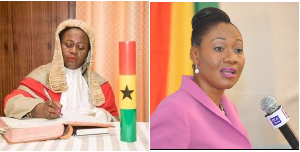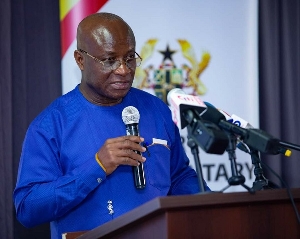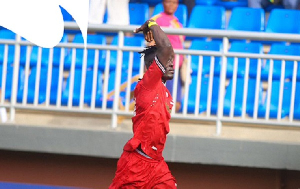Power is said to reveal the true character of an individual, and for many years, Ghanaians have held the belief that women in leadership would bring a higher moral compass to governance. It was with great optimism that the nation welcomed two women into key positions: the Chief Justice and the Chairperson of the Electoral Commission (EC).
Coincidentally, it is the second time women are heading these institutions in the nation’s history. However, in recent times, these women have become the center of growing controversies and have faced harsh criticism for their questionable actions and bias that have sent shockwaves throughout the country.
The Electoral Commission boss, Jean Mensa, entrusted with upholding Ghana's democracy, has presided over a tenure marred by allegations of bias and partisanship. Many believe that the credibility of the electoral process has been undermined, with decisions and actions that seem to favor the governing party, the New Patriotic Party (NPP).
Accusations of electoral malpractice, voter disenfranchisement, and a lack of transparency have cast a dark shadow over the electoral institution, sparking mass public protests and diminishing trust in the democratic process. Some stakeholders accuse her of prioritizing the interests of the ruling government in critical electoral reforms-the exclusion of birth certificate from the list of primary documents to acquire a voter’s ID card.
Result Collation Errors: After the 2020 presidential elections, Jean Mensa’s declaration of the results was marred by inconsistencies. Multiple revisions to the figures announced by the EC caused confusion and raised doubts about the commission's competence. Critics pointed out errors in arithmetic calculations and discrepancies between initial and corrected figures, eroding public trust.
Accusations of Bossy Behavior: Alleged Autocratic Leadership Style. Accusations of Jean Mensa’s autocratic management have surfaced from within the EC and among external stakeholders. Some staff members reportedly felt sidelined in decision-making processes, with claims that she often bypassed consultative processes, preferring to enforce her decisions unilaterally. Political parties, especially those in opposition, have accused her of not adequately consulting with them on critical electoral matters.
The EC’s engagements with political parties have mostly been dismissive of legitimate concerns raised by opposition parties, especially the NDC, contributing to a perception of a lack of accountability and transparency. Recently, the EC refused a request to allow for an independent audit of the IT system which is fraught with identity and access management issues.
Some stakeholders argue that Jean Mensa’s administration has failed to respect the democratic principle of open communication. The EC’s performance during the Supreme Court case challenging the 2020 election results, exposed some procedural inadequacies. The commission's refusal to testify or defend its processes in court was perceived by some as an admission of flawed electoral practices. The EC boss has repeatedly defended her actions, but the evidence of public dissatisfaction is undeniable.
On the other hand, the Chief Justice, the very person responsible for maintaining the rule of law and ensuring the impartiality of Ghana's justice system, has not been spared from criticism. The public outcry has reached fever pitch, with claims of biased rulings and decisions that seem politically motivated.
Citizens and legal experts alike have pointed to instances where justice appears to have been compromised for political expediency. The perception of partiality in the judiciary threatens the very foundations of Ghana's legal system, leaving many to wonder if justice is truly blind or if it serves a select few. Since her appointment as Chief Justice, Gertrude Torkornoo has faced criticism, regarding perceived biases and administrative decisions.
Key concerns include:
Allegations of Bias in Case Scheduling: Chief Justice Torkornoo has been accused of "palpable bias" in prioritizing certain political cases over others. The expedited scheduling of a case filed by MP Rockson-Nelson Dafeamekpor, for hearing ahead of an earlier-filed case by Richard Dela Sky challenging the constitutionality of the Sexual Rights and Family Values Bill is an example.
SALL (Santrokofi, Akpafu, Likpe, and Lolobi) region: Also, the ongoing situation involving the SALL region, which remains without parliamentary representation, has added to the controversy. The Chief Justice and the Supreme Court have failed to ensure swift and fair resolution, leaving constituents disenfranchised and frustrated.
Supreme Court Rulings on Parliamentary Seats: Additionally, the Supreme Court, under Chief Justice Torkornoo's leadership, ruled against Speaker Alban Bagbin's declaration of four parliamentary seats as vacant. This decision was met with criticism from some quarters, who perceived it as favoring the ruling party.
Conclusion: It is profoundly disheartening to witness the erosion of public trust in these two pivotal institutions, led by women who once symbolized hope for a more ethical and accountable leadership. What happened to the promise of a new era of moral leadership, where women would stand as paragons of integrity? Instead, Ghanaians are left grappling with the bitter truth that gender alone does not shield leaders from the temptations of power or the pitfalls of partisanship.
The failures of these women in power serve as a wake-up call for Ghanaians. It is a sobering reminder that the fight for accountable and transparent governance transcends gender; it is a fight that demands vigilance, continuous scrutiny, and the unwavering courage to hold leaders accountable, regardless of who they are.
As the nation reflects on these painful disappointments, it must remain committed to ensuring that every leader- whether male or female- upholds the values that Ghana stands for: justice, fairness, and the sanctity of democracy.
Click to view details



Opinions of Wednesday, 27 November 2024
Columnist: Cletus Siebune



















